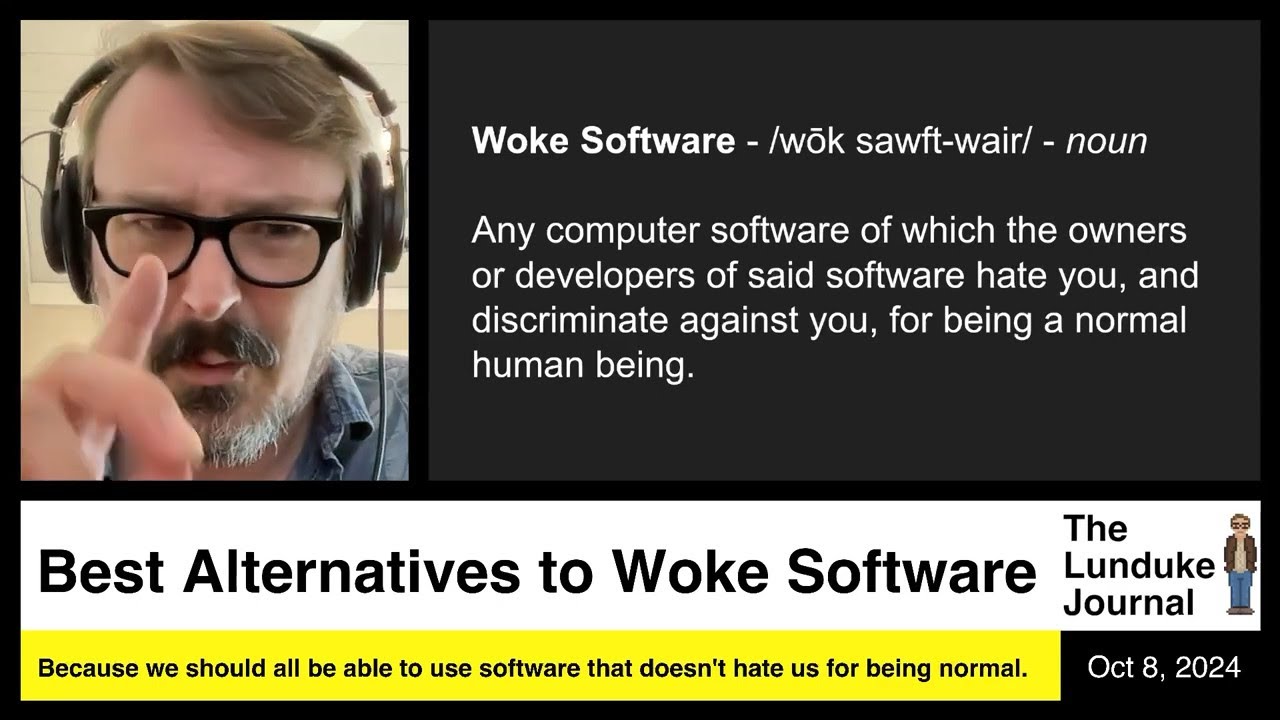The video discusses the concept of “woke software,” which discriminates against users based on identity or beliefs, and contrasts it with “non-woke software” that focuses solely on quality without political agendas. The speaker provides a list of non-woke alternatives across various categories, including operating systems, web browsers, email clients, and social media platforms, encouraging viewers to explore these options.
In the video, the speaker discusses the concept of “woke software,” defining it as software developed by companies that discriminate against users based on their identity or beliefs. The speaker contrasts this with “non-woke software,” which is created by developers who focus solely on producing quality products without imposing political or social agendas. The speaker emphasizes that differing political views are acceptable, but discrimination against users based on their identity is not. The video aims to provide a list of alternatives to woke software across various categories, including operating systems, web browsers, email clients, office suites, graphic design software, search engines, video platforms, and social media.
Starting with operating systems, the speaker identifies several woke options, such as Red Hat, IBM, and Microsoft Windows, citing their discriminatory practices and political agendas. In contrast, non-woke alternatives like Debian, Arch, and Ubuntu are recommended for their focus on software quality without political bias. The speaker also mentions FreeBSD, which is currently in a gray area but may shift towards the non-woke category in the future. The discussion highlights the importance of choosing operating systems that do not impose political ideologies on users.
The video then transitions to web browsers, labeling Mozilla Firefox and Google Chrome as woke due to their political agendas and discriminatory practices. The speaker recommends Brave and Ladybird as non-woke alternatives, emphasizing their commitment to user privacy and neutrality. The discussion on email clients identifies Microsoft Outlook and Mozilla Thunderbird as woke, while Betterbird is suggested as a non-woke option. The speaker notes that many users now rely on webmail services, but standalone email clients still hold relevance.
In the realm of office suites, Microsoft Office and Google Workspace are categorized as woke, leading the speaker to recommend LibreOffice with some reservations due to its ties to woke groups. For graphic design software, Adobe’s Creative Suite is deemed woke, while GIMP is suggested as a non-woke alternative, despite its association with the woke GNOME project. The speaker advises users to consider alternative desktop environments if they choose to use Ubuntu to avoid the influence of woke software.
Finally, the video addresses online services, including search engines and video platforms. Google and Bing are labeled as woke, while Brave Search is presented as a viable non-woke option. The speaker highlights the emergence of non-woke video platforms like Rumble, Locals, and Substack, which have gained traction as alternatives to YouTube. In the social media space, X (formerly Twitter), Locals, and Truth Social are identified as non-woke platforms, showcasing a shift towards more inclusive and diverse options for users. The speaker concludes by expressing optimism about the growing availability of non-woke software and services, encouraging viewers to explore these alternatives.
